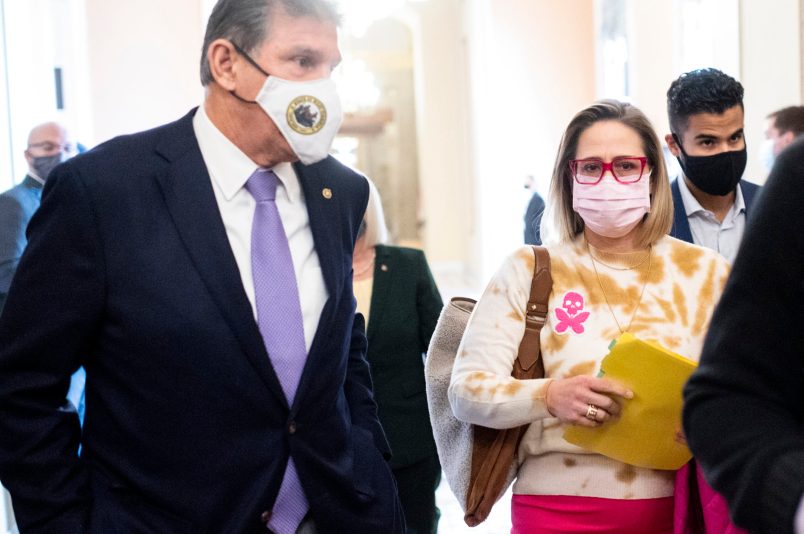Sens. Kyrsten Sinema (D-AZ) and Joe Manchin (D-WV) joined all the Republicans in blocking a temporary filibuster rule change that would have allowed Democrats to pass voting rights legislation with a simple majority.
The nearly year-long effort to win the two over, through repeated votes, speeches, endless meetings and presidential pressure failed hours before the anniversary of President Joe Biden’s inauguration.
The filibuster, the supermajority threshold on most legislation that acts as a veto for the minority party, was injected into the public debate over a year ago, when Sens. Jon Ossoff (D-GA) and Raphael Warnock (D-GA) gave Democrats the barest possible effective majority in the upper chamber. Manchin, and maybe other moderates, Senate watchers knew then, posed a problem. But there was a strategy.
Democrats involved Manchin intimately in every step of crafting their voting rights legislation, the nexus at which they thought their chances of swaying him on filibuster would be most potent: the horror of Jan. 6 was fresh, and former President Donald Trump’s attempts to overturn the election still very recent history.
When he opposed some parts of the marquee voting rights bill, the For the People Act, it was reworked to win his support. Sinema also quickly became vocal about her devotion to the filibuster, but she, too, supported the underlying voting legislation.
The other 48 Democratic senators, including those who previously opposed filibuster reform, came around. Almost all of the most reluctant cited the looming threat to democracy as the issue that compelled them to overcome their queasiness about changing the way the Senate functions.
A pack of senators, including Sens. Amy Klobuchar (D-MN), Tim Kaine (D-VA) and Jon Tester (D-MT), gathered with Manchin and even accompanied him on his meetings with Republicans, as he insisted that there could be bipartisan support for these bills.
Democrats held sure-to-fail votes on the legislation, aimed at showing Manchin that Republicans would only ever block bills to expand voting rights.
The effort began to stall out. Other Democratic senators implored the two, directly and through the press, to recognize that changing a Senate rule was a price worth paying to protect a democracy under assault. Voting rights activists agitated for President Joe Biden to get behind the mission full-throatedly, to use the influence of the presidency to bully, cajole or force the two to join the rest of the caucus.
Democratic lunch hours became forums for lectures on the history of the filibuster, with Senate Majority Leader Chuck Schumer (D-NY) bringing in historians and professors to show the two that the filibuster is neither ancient nor sacred, but a fairly modern invention most famously used to block civil rights legislation. Nothing changed.
Finally, Schumer announced that in mid-January, near the anniversary of the insurrection and Martin Luther King Jr. Day, the Senate would vote on the voting rights legislation. When Republicans filibustered that, they would vote on reforming the filibuster. It was time, many members echoed, to get everyone on the record.
Sinema and Manchin quickly deflated the event of any lingering drama. Sinema, in a speech timed just an hour before Biden arrived at the Capitol to make a final pitch, expressed her enduring support of a 60-vote threshold to an audience largely made up of Republicans. Manchin followed her speech up with a statement expressing his refusal to “weaken or eliminate the filibuster.”
The tone of the conversation changed. Major women’s rights groups threatened to pull their support from Sinema if she voted to sustain the filibuster. Sen. Bernie Sanders (I-VT) started publicly entertaining the prospect of supporting primary challengers to the two — Schumer dodged the question.
And the vote to reform the filibuster rule failed. After hours of floor speeches, where Democrats made case after case for scrapping the rule for the legislation and Republicans warned of dire consequences if they do, Manchin and Sinema ultimately stayed locked in to the positions they took months ago.
“I have never wavered on this,” Manchin said Wednesday before the vote, his hand on his heart as he addressed his blankly staring Democratic colleagues. “I do not and will not attack the contents of the character of anybody who’s changed their position, and I hope you would give me the same opportunity and not attack mine.”







Boo fuckin hiss.
Sow the wind, reap the whirlwind, you feckless scumbags.
Heart attacks deserved. 52 of them.
The term Bad Faith will come up.
It’s too weak.
We now have a 48-52 minority. Manchinema is not reliable.